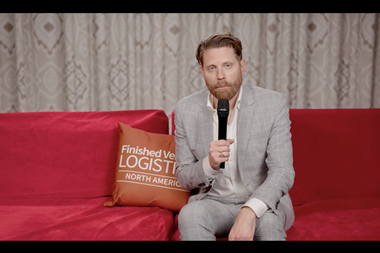Automation of logistics processes is the key to an efficient automotive aftermarket supply chain.

The availability and distribution of vehicle parts to meet service and installation needs are critical to the aftermarket industry. Rising demand from quicker turnaround, more complexity and the variety and availability of parts all place increasing pressure on the logistics operations that support the industry.
So, logistics companies operating in this sector need to lead the industry in the application of technology if they want to stay ahead of the competition. Aftermarket logistics is already one of the most forward-thinking online retail businesses – and I believe that companies who fail to look ahead simply won’t survive.
The good news is that with a high volume of repeatable transactions and repeatable processes, aftermarket logistics has massive potential for successful automation. And the benefits aren’t just about costs. Automation also frees up time to focus on business strategy and future planning. By anticipating future challenges you give your business scalability and agility.
Key challenges and an automated approachCustomers expect more all the time. Driven by the online retail market, there is an increasing expectation that all parts should be available now. The internet has given consumers options, meaning that if you can’t get the part, they’ll just go elsewhere.
Stock availability is a key aftermarket logistics KPI. Most aftermarket businesses use sophisticated forecasting tools to estimate parts and inventory levels. Sales history, seasonality and economic factors all affect future sales. The closer SKU (stock keeping unit) availability is to 100%, the larger the warehouse capacity needs to be. In fact, some leading larger aftermarket businesses are already investigating 3D printing as an alternative to holding stock.
A diverse geographical customer base with high demands magnifies the problem of stock availability. Due to next day or even same day expectations, aftermarket businesses are locating stock closer to the customer. This exacerbates the inventory problem, creating duplicate stock and spiralling costs - but gives a greater service to support growth in sales.
What's the solution? There isn't just one...Using one transport provider is unlikely to enable a business to both meet these challenges and support service levels. Traditionally, aftermarket businesses have outsourced to a single 3PL company. Over time this means a lack of control and arguably a loss of internal transport expertise. Companies end up tied to their 3PLs for decades – apprehensive about leaving the relationship because of fear of the unknown. Introducing systems into your business gives you back control: introducing more automation and a multi carrier solution ensures better delivery options for all consignments.
Introducing a transport management system (TMS) can take care of most of these issues. Integrating the TMS into the ERP and WMS ensures that data is communicated seamlessly, in real time.
A multiple carrier solution has cost and service benefits, but can also introduce more complexity managed through a TMS. As orders are captured and processed through the warehouse, they are allocated to the chosen carrier based on geographic destination, delivery service level and consignment size. Because of the nature of the aftermarket industry, order processing is in real time, for orders to be shipped at the end of the day / same day etc. A framework of automated rules can provide structure to ensure orders are shipped using the right method.
In order to ensure consignment tracking, labels must be attached to each parcel. These labels are then scanned through carriers’ hubs onto vehicles and then upon delivery. Electronic signatures are captured at the point of delivery in order to prove the delivery has been made to the right person. Each carrier operates its own labelling solution to a pre-agreed format. The right TMS can print labels regardless of carrier, removing the need for a solution for each carrier. A TMS can also be used to capture and display multiple carrier GPS data in real time through a portal that can actually track, not just the individual parcels but if product is scanned into the parcel, the products that are in each parcel.One of the biggest manual processes within an aftermarket logistics operation is often the invoice auditing processes. A busy aftermarket distribution centre can ship thousands of consignments per day. Combined with the complexity of multi carrier tariffs, the myriad of adjustments and surcharges, this makes it virtually impossible to check the rates individually. The right TMS can manage this process automatically, avoiding the need to manually check rates whilst highlighting errors or service promises that have not been met.
One of the biggest advantages of a single TMS that manages the end to end process is the rich level of management information available. It’s easy to produce reports by market, service levels, carrier, individual aftermarket dealer and cost of sale. This data means you can make the right strategic decisions and monitor trends and changes in behaviour. It’s not just about the availability of data (too much data has its own issues) it’s about ensuring that the right information is seen at the right level within the business. This data can then be used to enhance forecasts and ensure better parts availability.
Automation and IntegrationAutomation of individual processes is fairly straightforward these days. The challenge is the integration through multiple systems, to ensure that seamless data integrity maintained through the process. This is where enterprise systems have monopolised the market previously. Delivering products outside of the company to customers who may be located globally using 3rd party service providers means that inevitably control is lost and systems fail. Industry 4.0 (the 4th industrial revolution) is all about the integration and connectivity of individual niche systems to provide an end to end process that is tailored to the customer’s individual requirement. The days of the large enterprise based system approach are numbered. Expertise, system components and integration is where the future lies.
Tim Fawkes is the managing director of 3T Logistics


























![Global[1]](https://d3n5uof8vony13.cloudfront.net/Pictures/web/a/d/s/global1_726550.svgz)









